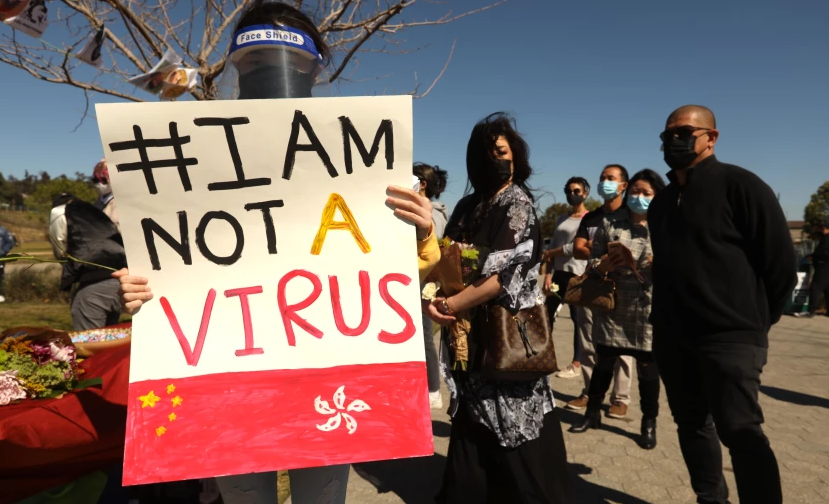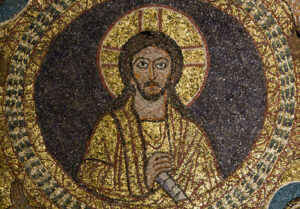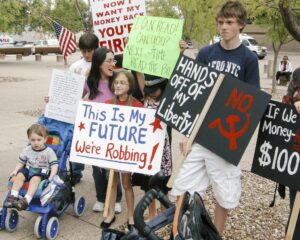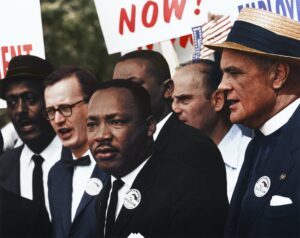Anti-Asian prejudice stems from historic anxieties about Christian America’s demise at the hands of foreign labor, birthed long before a mendacious real estate developer exploited Asian Americans to win the presidency.
“THE virus came from China,” Rep. Kevin McCarthy (R-Bakersfield) informed journalists on March 18, two days after a gunman hoping to “eliminate” his “sex addiction” murdered eight people, six of them Asian women, in spas across Atlanta.
McCarthy offered this profundity when asked whether the shootings provoked regret about his use and defense of the term “Chinese coronavirus” last year. Meanwhile, his state was undergoing an anti-Asian hate wave unlike anything the country has seen in decades. McCarthy, a member of the same denomination as Robert Aaron Long, seemed to think it appropriate to remind his base that blaming China is actually good, turning attention toward the right’s favorite scapegoats (“Does CNN regret that? Does the Democratic committee … regret that?”). Not only was his response a barely coherent denunciation of racism, it avoided any examination of the religious institutions that shaped the mind and soul of a mass murderer.
It goes without saying that McCarthy’s response was atrocious. Still, the relative dearth of substantive attention to that response is troubling. Asians in America have tolerated white supremacy for so long that we often lack language to identify its more exotic manifestations, let alone the willpower to mount opposition to it. The historic post-Atlanta rallies against anti-Asian hate, largely fueled by Christian activists, came almost exactly one year after McCarthy and his fellow devout congressmen incited a severe spike in anti-Asian animosity.
McCarthy, a Southern Baptist, railed against a “China-born disease”. Sen. Josh Hawley, a Presbyterian, contended that “normal” Missouri voters see China primarily as a “threat.” Rep. Paul Gosar, a Catholic, brandished the term “Wuhan virus” no less than three times on the same page of his website. The Christian identity of elected Sinophobes had attracted virtually no attention when, this past December, I drafted and circulated my open letter on the anti-Asian racism of 18 Christian nationalist politicians and their enablers in Christian churches.
Perhaps the connection between anti-Asian racism and religious devotion seems too obvious to warrant further comment. Maybe the question of religion appears unimportant, an academic distraction from the brute fact that elected officials, regardless of religious identity, are whipping up fear and hatred. (Certainly, more than one prospective signatory has declined to join the open letter because they “don’t wish to highlight the religion” of these politicians.) But it’s high time we interrogate the fact that the same white supremacists who bore “Jesus Saves” flags into Congress celebrated their attack by tearing up a Chinese scroll. Doing so requires stepping back and assessing how such prejudice stems from anxieties about Christian America’s demise at the hands of foreign labor, birthed long before a certain mendacious real estate developer exploited them to win the presidency.
From “Yellow Peril” to “Model Minority”
Anti-Asian racism has always been bound up with concerns about preserving the nation’s putatively Christian character, specifically from the depredations of a pagan working class. In her book Alien Capital: Asian Racialization and the Logic of Settler Colonialism, Iyko Day situates Asian in North America within an “evolving triangulation of Native, alien, and settler subject positions,” through which Asianness comes to represent “the intangible, destructive dimension of capitalist relations” (34). By personifying “the threateningly abstract economism of capitalism,” Day argues, whites could effectively identify themselves with the Native populations they had violently eliminated, “imagining whiteness through indigenizing tropes of purity and organic connection to land” (37). While Day does not focus on the theological dimensions of this triangulation, she cites a turn of phrase from white supremacist historian Lothrop Stoddard that brings this dimension to the fore: “Nothing is more striking than the instinctive and instantaneous solidarity which binds together Australians and Afrikanders, Californians and Canadians, into a ‘sacred union’ at the mere whisper of Asiatic migration” (italics added).
That “sacred union” of European settlers carried particular resonance in America, where post-Reconstruction “Anglo-Saxons” were anxious to re-establish the theological, biological, and economic superiority of white Christians. Thus, the favored epithet for the coolies of 19th century California was “the heathen Chinee.” A misprision of Bret Harte’s satirical poem of the same name, the vogue for this term ignored Harte’s intent to criticize Irish workers’ prejudice toward their fellow Chinese laborers. Instead, the phrase connoted unironic aggression towards the “idolatrous” and lascivious character of the railroad-building “heathen,” whose alleged affinity for alien gods, prostitution, and gambling elicited both missionary zeal and xenophobic animosity. It was this religiously inflected animus that prompted Ambrose Bierce to darkly speculate, upon hearing news of a murdered Chinese woman in San Francisco, that she “died of galloping Christianity of the malignant California type.” Collapsing alarm about Chinese idolatry into nativist concerns about job competition guaranteed that “galloping Christianity” would rush to defend the white working man, by any means necessary.
What I call “sanctified Sinophobia” has long served to baptize racial capitalism, a system that facilitates the extraction of economic and social value from racialized bodies. Religious concerns drove support for the 1882 Chinese Exclusion Act, the first—and, excepting Trump’s Muslim ban, arguably the only—piece of American immigration law that ever explicitly targeted a particular ethnic group. In an 1877 Senate report, Rev. Blakeslee, a white proponent of exclusion, argued that, whereas “slavery [had] compelled the adoption of Christian forms of worship [amongst Black Americans] . . . the Chinese have no such influence tending to their conversion.” Blakeslee gave voice to widespread concerns that incorrigible idolaters would exceed their proper position as cheap laborers within a definitively Christian civilization, “heathenizing” the society they were tasked with silently serving. In the words of Secretary of State William Seward, “the difference between Chinese and Christian civilization” made “the prospect of further Chinese immigration … absolutely unbearable.” Ultimately securing passage of the Exclusion Act, this sort of rhetoric distanced not only white laborers, but also Black freedmen, from Asiatic polytheists.
Once we arrive at the 1960s, however, this narrative undergoes a curious inversion. No longer uniquely heathen, Asians now (unlike other minorities) “know their place” in Christian America. William Pettersen’s infamous 1966 article, which first touted the “model minority,” hypothesized that the “frugality” and “diligence” of so-called “Tokugawa religion” made Japanese Americans especially amenable to the work and family values of American Protestantism, regardless of their personal theologies. Pettersen asserted that “respect for authority is strongly enforced in the Japanese American churches, whether Buddhist or Christian.” Their sacred respect for authority, he enthused, undergirded the success of Japanese Americans in overcoming decades of discrimination. Reinforced by arguments that the 1954 Immigration Act would only produce a minor spike in Asian immigration, depictions of respectful Orientals neutralized fears that the 1965 Immigration Act would unleash the Yellow Peril.
Though originally applied to Japanese Americans, the “model minority” trope has expanded to encompass a wide swathe of Asians in America ‒ and religion has played a key role in that expansion. Christians form the largest religious demographic of Asian America, reflecting the fact that immigrants to America tend to come from “the Christian sector of their home country,” as Stephen Warner observes. Already predisposed to adopt America’s majority religion, second-generation Asian American Christians experience extra pressure to perform respectability politics. One significant source of this pressure are college parachurch organizations that target ethnic groups. As sociologist Jerry Park writes, these organizations play an important role in assimilating second-generation Asian Americans, “sacralizing” Confucian values such as “traditional family norms, industriousness, and educational attainment” and blending them with Evangelical spirituality. In short, if the first wave of post-1965 immigrants arrived in a country newly introduced to the notion of a “model minority,” much of the second wave came of age saturated with the message that God expects them to conform to neoliberal ideology. At a critical stage in their pre-professional lives, these young Asian American believers were compelled to enter the job market embodying archetypes that, in the Sixties, first enabled racial capitalism to accommodate their predecessors.
While the ascent of Asian American Christianity might seem to undercut my claims about sanctified Sinophobia, we should understand this ascent as a corollary of a longstanding hostility, rooted ultimately in capital’s exploitative drive, that never disappeared. To the extent that Asian American Christians ally with the majority religion—for the most part, with conservative evangelicalism—they acquire fluency in the symbolic order of America’s civic life and access to networks of power. But the cost of that access is vulnerability to an ideology whose foremost advocates make contemptuous references to Christians in “Communist China,” market Orientalist depictions of Eastern malevolence, and paint socialism as wicked for their flock of admiring Chinese American disciples. Even before Donald Trump’s anti-Chinese bellicosity, the legacy of the “heathen Chinee” haunted Asian American Christianity’s desperate pursuit of middle-class rectitude.
Sanctified Sinophobia Revisited
Prior to 2016, a longstanding Christian nationalism provided a powerful sacred myth to justify the exploitation of Asians. But the ascent of Donald Trump—evangelicals’ “King Cyrus”—ushered in a gritty reboot of that myth. Indeed, Trump seized on an opportunity to play to his evangelical base during a 2019 press conference on his trade war with China. “I am the chosen one,” he said, looking heavenward, a classic Trumpian moment in which he touted his divine mandate to immiserate American farmers in the name of tanking China’s economy. As Noah Berlatsky wrote at the time, Trump’s joking-not-joking proclamation “simply restat[ed] the longstanding white Christian belief that white people are divinely selected to subjugate everyone else.”
Six months after Trump’s disclosure of this messianic secret, the coronavirus handed him an opportunity to escalate his crusade against the yellow peril. A March 19 photograph of a page from one of Trump’s written speeches, with the word “Chinese” written over “corona” in Sharpie, captures Trump’s deliberate racialization of the pandemic. And while he didn’t explicitly couple “chosen one” with “China virus,” his loyal disciples received the message. In a study based on surveys taken in March and April 2020, Samuel Perry, Andrew Whitehead, and Joshua Grubbs found that “Christian nationalism was invariably the strongest predictor that Americans felt it was not racist to call COVID-19 ‘the Chinese virus.’”
If the rank-and-file were taking notes, so, too, were Trump’s loyalists in Congress. On cue, politicians like Tom Cotton, lifelong member of the First United Methodist Church of Dardanelle, asserted their God-given right to exploit, denigrate, and erase the contributions of non-white laborers and consumers. “Do your best to arrest the spread of the China virus,” Cotton tweeted on March 25, 2020. Appealing to Christian voters as he has throughout his career, Cotton followed this with the orison, “God bless our brave docs and nurses.” Whether that benediction extended to the large contingent of Filipinx American medical professionals, who might view the term “China virus” as more curse than blessing, went unremarked.
Cotton and other Christian soldiers also attempted to enshrine prejudice into law. In May 2020, Cotton joined Sen. Marsha Blackburn, faithful member of Nashville’s Christ Presbyterian Church, in sponsoring the “SECURE CAMPUS Act,” which would have banned Chinese graduate students from pursuing American STEM degrees. A few months later, a similar bill promised Homeland Security increased powers to restrict visas for anyone “reasonably suspected” of espionage, thanks to Sen. Ted Cruz, a member of Houston’s First Baptist. In a press release trumpeting the attempted legislation, Cruz specified his concern about Chinese spies absconding with American intellectual property. Kevin McCarthy himself spearheaded the GOP’s China Task Force Report, which also recommends increased aggression against Chinese espionage. Not to be outdone, another member of Congress’ Southern Baptist cadre, Sen. Lindsey Graham, proposed “prohibit[ing] Chinese nationals from obtaining student visas (i.e., F and M visas) or exchange visitor visas (i.e., J visas)” if the President cannot certify that “the Chinese government is cooperating with efforts related to the COVID-19 outbreak.”
With the exception of Cotton’s tweet, none of these examples of xenophobia required broadcasting theological rationales for restricting visas, or banning Chinese STEM students, or combating an overblown spectre of Chinese intellectual theft. They merely had to speak as self-identified Christian soldiers, a brand already built through countless prayers, botched Bible references, and photo-ops with celebrity pastors. Nor did any of the attempted legislation require actual passage to achieve a desirable effect. Their ultimate upshot was to influence the incoming president, whose fixation with the ever-elusive “good Republican,” combined with his taste for a gentler brand of Christian nationalism, all but guaranteed that he would continue anti-Chinese protectionism.
Hence, Biden, whose March 11 speech offered a denunciation of anti-Asian racism (and ended with a triplicate invocation of God), now considers China’s contribution to “excess capacity [in] solar energy” as a “harmful trade practice.” Scapegoating Asian citizens may be un-American, but scapegoating Chinese solar panels is just business as usual. Taken as a whole, the nativist belligerence of Republicans and the Democrats who mimic them serves less to counter any supposed threat from Chinese students or workers, and more to throttle the Chinese economy, worsening conditions for the foreign laborers who build America’s cars.
If the resurgence of sanctified Sinophobia demonstrates how Christian nationalists uphold racial capitalism, it also shows how racial capitalism props up Christian nationalists. Like a photonegative of university application brochures that exploit images of happy minority students, Scripture-quoting politicians promulgate hatred through commodifying depictions of Chinese, not as desirable customers, but as objects of loathing and suspicion. The doubtlessly well-paid roster of speakers at CPAC 2021 ($330 for a basic ticket, $7500 for “gold package” admission!) included no less than eight of the politicians named in my open letter, almost all of whom gave attendees their money’s worth by playing to anti-Chinese sentiments. At the same time, they effortlessly retain their standing with their home churches, which frequently feature anti-racist or vague diversity statements on their websites. The reason, of course, is that such statements allow pastors to elicit tithes from non-white congregants, in the same way that ethnically diverse college admissions pamphlets attract the attention of non-white applicants. Their less publicized, but still public, relationship to bigoted-but-wealthy donors thus continues unabated.
Halting the Gallop
In light of this history, the recent wave of physical and verbal assaults on Asian Americans becomes legible as a form of collateral damage, an acceptable cost to Christian nationalists who are waging a holy—and wholly profitable—war on “godless Communist China.” Sanctified Sinophobia has helped create the conditions that allowed the Atlanta killer to see massage therapists as dangerous and disposable. Whatever the murderer’s deepest motives, any reservations he might have had about opening fire evaporated in a culture that refuses to hold those like Rep. Kevin McCarthy accountable. Moreover, in slaughtering Asian women whom he assumed to be sex workers—only some of might have actually engaged in that work—the killer performed the same function as ICE raids: keeping non-white labor in a near-permanent state of precarity, terror, and vulnerability. It’s telling that the killer erupted only after he was kicked out of his parents’ house, thereby placed in a situation closer to that of the workers he both desired and despised. Ambrose Bierce might have recognized in Atlanta the same “galloping Christianity” that stalked the streets of Chinatown, looking for threats to the purity and economic security of hard-working white men.
What is to be done in the face of this endlessly restaged morality play, this lucrative Manichean fantasy, in which white people pony up consciences, votes, donations, and tithes for the chance to play first Avenger, last samurai? Gallop faster? A century and a half of running into the arms of bourgeois piety and safe diversity statements hasn’t solved anything. In calling for an end to collaborations between politicians and enabling pastors, as well as for solidarity from the laity who attend church with both, my open letter is an attempt to confront and halt zeal for God and country in its tracks. By joining its 600+ signatories, you can help us force sanctified Sinophobes to reconsider the Nazarene carpenter’s question about what well-resourced racists stand to gain, and what they stand to lose.
Lucas Kwong is a writer, musician, and assistant professor of English at New York City College of Technology. He writes at eschatontwist.substack.com and has been published at Public Books, Red Letter Christians, Christian Century, and Sojourners.
Sign the open letter at againstchristianxenophobia.com and follow on Twitter, Facebook and Instagram.




